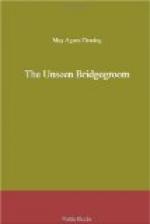“If it had been Doctor Oleander, would you have consented to stay with him as his wife?”
“Doctor Oleander? No. Didn’t I say if it were some one I did not absolutely abhor? I absolutely and utterly and altogether abhor and detest Doctor Oleander!”
“What is that? Some one is listening.”
Miriam had started in alarm to her feet; Mollie rose up also, and stood hearkening. There had been a suppressed sound, like a convulsive sneeze, outside the door. Mollie flung it wide in an instant. The hall lamp poured down its subdued light all along the stately corridor, on pictures and statues and cabinets, but no living thing was visible.
“There is no one,” said Mollie. “It was cats or rats, or the rising wind. Every one in the house is asleep.”
She closed the door and went back to the fire. As she did so, a face peeped out from behind a great, carved Indian cabinet, not far from the door—a face lighted with a diabolical smile of triumph.
CHAPTER XII.
“BLACK MASK”—“WHITE MASK.”
“Finish your story!” exclaimed Miriam, impatiently. “Morning is coming, and like owls and bats and other noxious creatures, I hide from the daylight. How did you escape?”
“I didn’t escape,” said Mollie. “I couldn’t. The week expired—my masked husband kept his word and sent me home.”
“Sent you! Did he not fetch you?”
“No; the man who drove the carriage—who, with the girl Sarah, witnessed the marriage—brought me. Sarah bound me, although there was no occasion, and the man led me down and put me in. Sarah accompanied me, and I was driven to the very corner here. They let me out, and, before I had time to catch my breath, were off and away.”
“And that is all?” said Miriam, wonderingly.
“All! I should think it was enough. It sounds more like a chapter out of the ‘Castle of Otranto,’ or the ‘Mysteries of Udolpho,’ than an incident in the life of a modern New York belle. For, of course, you know, Madame Miriam,” concluded the pretty coquette, tossing back airily all her bright curls, “I am a belle—a reigning belle—the beauty of the season!”
“A little conceited, goosey girl—that’s what you are, Mollie Dane, whom ever this terrible event can not make serious and sensible.”
“Terrible event! Now, Miriam, I’m not so sure about that. If I liked the hero of the adventure—and I have liked some of my rejected flirtees, poor fellows!—I should admire his pluck, and fall straightway in love with him for his romantic daring. It is so like what those old fellows—knights and barons and things—used to do, you know. And if I didn’t like him—if it were Sardonyx or Oleander—sure, there would be the fun and fame of having my name in all the papers in the country as the heroine of the most romantic adventure of modern times. There would be sensation novels and high-pressure melodramas manufactured out of it, and I would figure in the Divorce Court, and wake up some day, like Lord Byron, and find myself famous.”




